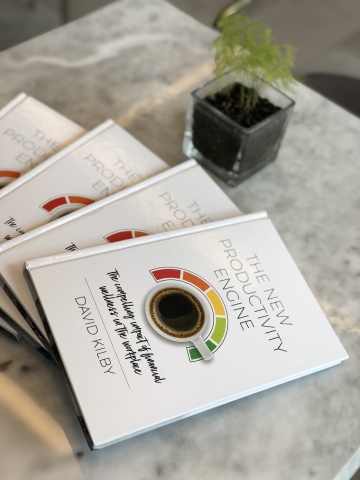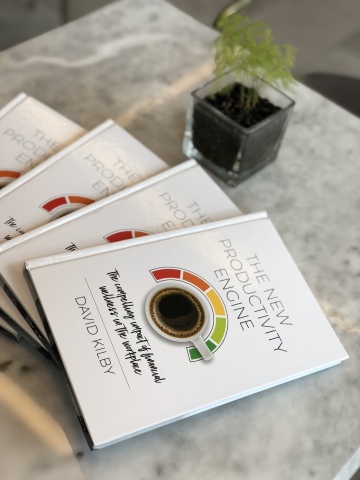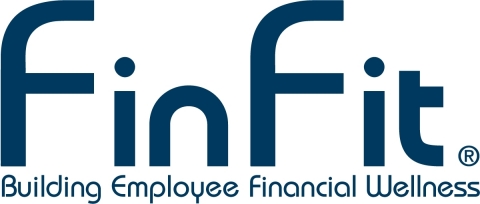VIRGINIA BEACH, Va.--(BUSINESS WIRE)--Businesses are perpetually concerned about improving worker productivity. Sometimes the answers involve technology, automation or process changes – fixes that are not always employee-friendly. Couple that with the astonishing research showing that 75 percent of American workers cannot come up with $1,000 cash in an emergency and are spending hours of work time worrying about a solution. Here’s an original, and fresh, answer to an old problem.
David Kilby’s The New Productivity Engine, (available from Amazon) outlines a different approach that can dramatically increase productivity and quickly solve financial problems, resulting in improved employee satisfaction and retention. Subtitled The compelling impact of financial wellness in the workplace, Kilby uses lively and believable real-life stories (rather than plodding textbook models) to showcase his innovative tactics. He cites national academic and business studies and media in his research. There are many visuals that demonstrate the challenge and solution.
“Employers in the U.S. are losing over $300 billion a year in productivity,” Kilby states, quoting notable sources. “Over forty five percent of employees spend an average of two to three hours work day hours a week on personal finances.” In the book, he cites ordinary problems like coming up with money for household bills, car repairs, emergency medical needs and sudden home repairs that can occupy workers’ minds, effectively talking them off the clock. “Financial wellness programs can help stem that loss while engaging and stimulating employees at the same time. It can also eliminate 401(k) raids, difficult conversations about employer advances and other high cost, non-responsive solutions. It’s a win-win for everyone.”
Kilby states in the book that financial wellness is a three-pronged approach: personal financial education, an employee motivation strategy and real-time financial solutions. “Without applicable financial solutions, it’s just another educational tool that doesn’t function very well in the real world.”
Kilby, who is president of FinFit, a national financial wellness platform, isn’t pushing his firm but rather the overall concept. He predicts that the financial wellness employee benefit will become as familiar and common in the workplace as health and retirement plans. “The really good news,” he says, “is that financial wellness platforms can actually generate measurable, increased productivity that goes right to the bottom line. This is a great read for any organization interested in the whats, whys and hows of implementing a financial wellness program.”
The New Productivity Engine is an easy, conversational and economic read. “I wanted to have an ‘airplane book’ that would quickly present, explain and demonstrate the concept during a flight between New York and Chicago,” Kilby notes. “We’re not reinventing the wheel, we’re just helping it deliver increased productivity.”
Visit dkilby.com for more about the author, David Kilby, and the book, The New Productivity Engine.
Who should read The New Productivity Engine: C-Suite, Human Resources, Benefit Planners, Professional Employer Organizations, Payroll Providers
About FinFit
Founded in 2008, FinFit has grown to be the nation’s largest financial wellness benefit servicing over 125,000 clients. FinFit provides a self-directed online experience that lets employees measure their financial well-being and provides fun, education resources and tools to increase their financial knowledge and drive results. FinFit helps to eliminate stress in the workplace by providing real-time solutions that offer real-world help when it is needed most. FinFit is a powerful way for employers to attract and retain talent by helping employees get focused, get healthy and become more productive.




